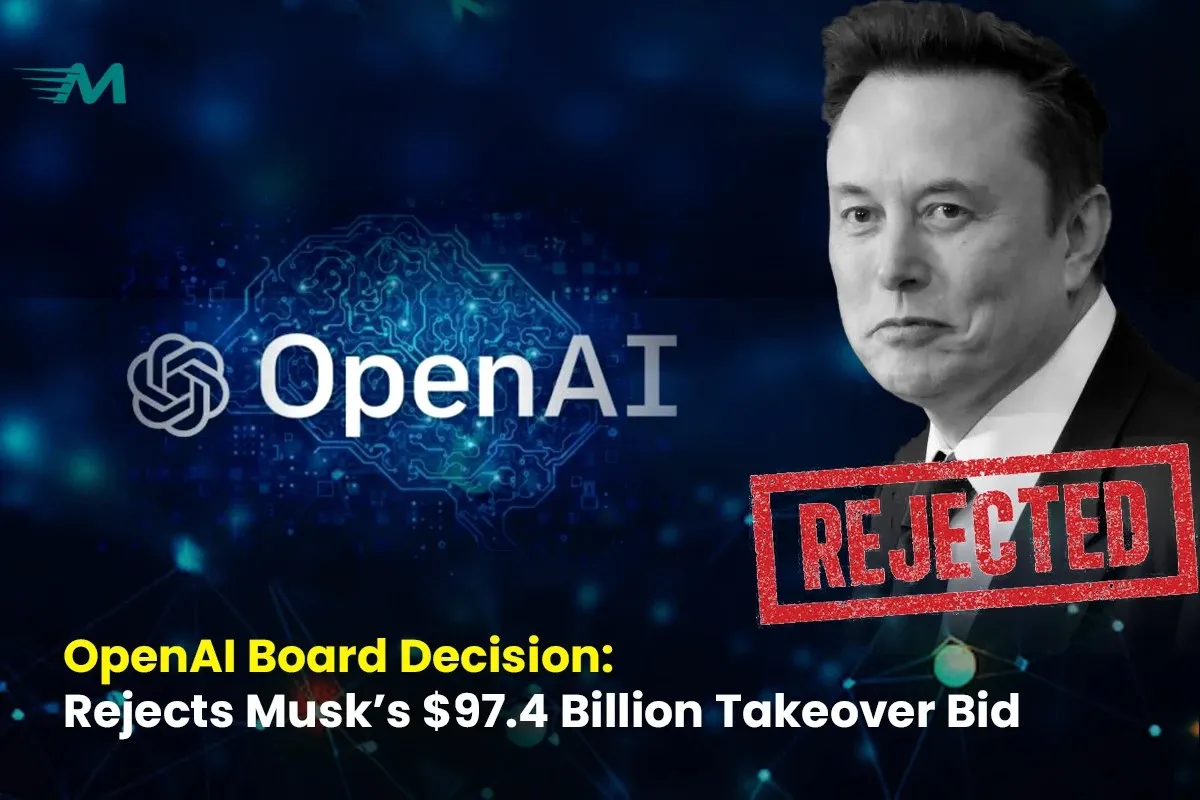OpenAI Board Decision: Rejects Musk’s $97.4 Billion Takeover Bid
The OpenAI board decision at OpenAI has stirred unprecedented reverberations within the tech and AI community. As a result, OpenAI in unison rejected Musk’s offer to buy it out hostilely for $97.4 billion-so it stated that it intended to remain forever independent and mission-oriented. Musk had wanted to buy back the company because he felt that the direction in which OpenAI was moving was disturbing. The statement of the board shows clearly that OpenAI is “not for sale” and therefore extremely serious about its longer-term vision for the future of AI.
The Stakes of Artificial General Intelligence (AGI)
Underlying OpenAI’s decision, however, is the mission of the company to develop artificial general intelligence (AGI)-AI that has the capacity to do almost every intellectual task a human being can do. The board has remained steadfast in its commitment to making sure the development of AGI is carried out in an ethical manner and responsibly with long-term interests in mind for humanity.
Indeed, there were some speculations about Musk’s control of OpenAI posing a threat to concentrating so much power into one individual or organization mainly concerning AGI development processes. This is yet another decision taken by the OpenAI board, reinforcing their opinion that AI development should remain with a broad and diverse community of researchers, technologists, and policymakers to prevent monopolies and undue influence toward unethical applications.
Musk’s $97.4 Billion Takeover Offer
Elon Musk’s takeover bid for AI came with a staggering $97.4 billion price tag. This offers Musk’s vision of the future of AI is decidedly broader, encompassing investments in other companies, such as Tesla and Neural ink. He has long, and very publicly, held that AI—especially artificial general intelligence—promises to solve many of the great challenges facing mankind. However, many inside the industry viewed Musk’s bid for control of AI as an attempt to wrest control from an organization that should remain independent.
Rejection of the bid by the board of OpenAI reflects wider apprehensions held in the tech community that AI development is increasingly centralized. AGI has the potential for far-reaching societal consequences with respect to the job market, national security, etc. Therefore, the general agreement is that no single entity or person, regardless of its power, should be allowed to develop AI. The rejection of Musk’s bid by the OpenAI board reaffirms their belief that AI growth must be carried out in a collective, transparent, and diverse manner.
OpenAI’s Mission and Vision
The board decision now coincides with a time when AI technology is emerging. OpenAI was founded in 2015 to ensure that all humanity has access to the fruits of artificial general intelligence. Since then, the organization has delivered some great technical breakthroughs in AI, to the best of which its models, GPT-3 and DALL·E, have showcased the potential ranges of AI in all major areas, image generation, machine learning, and beyond.
Thus, this decision, taken in keeping with the OpenAI mission of building safe and beneficial AI, rejected Musk’s offer; AI is not just a company but a body also concerned about research, safety, and social implications of AGI. Actually, remaining independent can help OpenAI guarantee that it follows its own vision and does not compromise by corporate interests or short-term earnings.
The Role of Independent Research in AI Development
Musk’s offer finds a denial because independent researches are significant in developing artificial general intelligence. Most especially during these days when several companies are going for advanced AI models, the board decision now proves that ethical development of AGI should not be run for financial purposes.
OpenAI now decides to be independent and, therefore, focuses on the long-term risks and the rewards associated with AGI and their clear collaboration in the global AI research community. Meanwhile, OpenAI’s work is open source. This means all research and findings are available for anyone who would like to take part.
Such an open culture will also be fundamental in encouraging the innovations in AI and mitigating risks associated with it. By the OpenAI board’s decision to continuously sustain this open culture, the company is made answerable before the public in deciding on questions as to safety or profit.
The Future of AI: Why the OpenAI Board Decision Matters
In a way, the OpenAI board decision is about rejecting a single takeover offer; in another sense, it is part of a broader conversation about the future of AI and artificial general intelligence. Let us set the stage: If we are understanding this power properly, AGI would divinely intervene in changing industries, economies, and societies. Development should be pursued assuming common good with multiple perspective plus systems of checks so that no one entity claims it.
The decision serves as the reminder for one and all regarding the responsibilities that come with very potent technologies, AGI being one of these. OpenAI said it did not want to sell itself, as that would compromise the ability to advance this mission. If AGI is to be used ethically for the interests of all, then OpenAI must remain free and independent.
Conclusion
For instance, the decision of the board of OpenAI to reject the bid for $97.4 billion from Elon Musk is significant in the history of AI in itself. It shows a deep commitment to the ethical character of its intended outcomes of artificial general intelligence and further stresses the point that AI research ought to be open, transparent, and accountable.
Thus, the OpenAI board guarantees, by their decision on the future of AGI, that OpenAI will work toward the mission that AGI will benefit all of humanity and not just a single person’s or corporation’s agenda. This decision serves as the arena where work on the development of AGI will be accomplished while also marking a turn in world history with long-term implications for the future of artificial intelligence.
FAQs:
1. Why did the board of OpenAI refuse to take up Elon Musk’s controlling share?
The bid of Musk for 97.4 billion dollars has been an OpenAI board rejected move for keeping this organization to its foundation use; to develop AGI but ethical and independent to make such a thing therein. They believe in wider community access rather than hoarding by one company.
2. What is artificial general intelligence (AGI)?
Artificial general intelligence is the development of “intelligent” machines that can perform any and all intellectual tasks that humans can do. AGI has the potential to be very advanced by AI standards and might create disruptive industries and solutions to some of the most complex global challenges. However, the skill is still under construction.
3. What does the rejection of the takeover bid mean for OpenAI’s future?
That OpenAI remains independent and continues its quest for developing artificial general intelligence in the safe, transparent, and ethics-consistent approach is guaranteed by this bid rejection. Thus, the decision takes utmost importance in keeping the organization true to the original purpose for which it was founded-the well-being of humanity.



